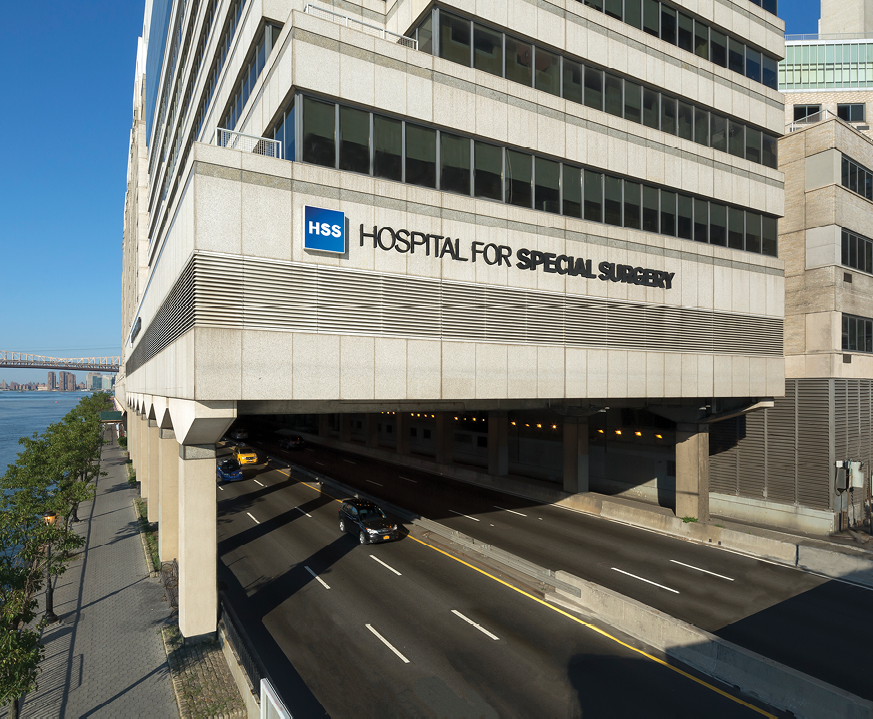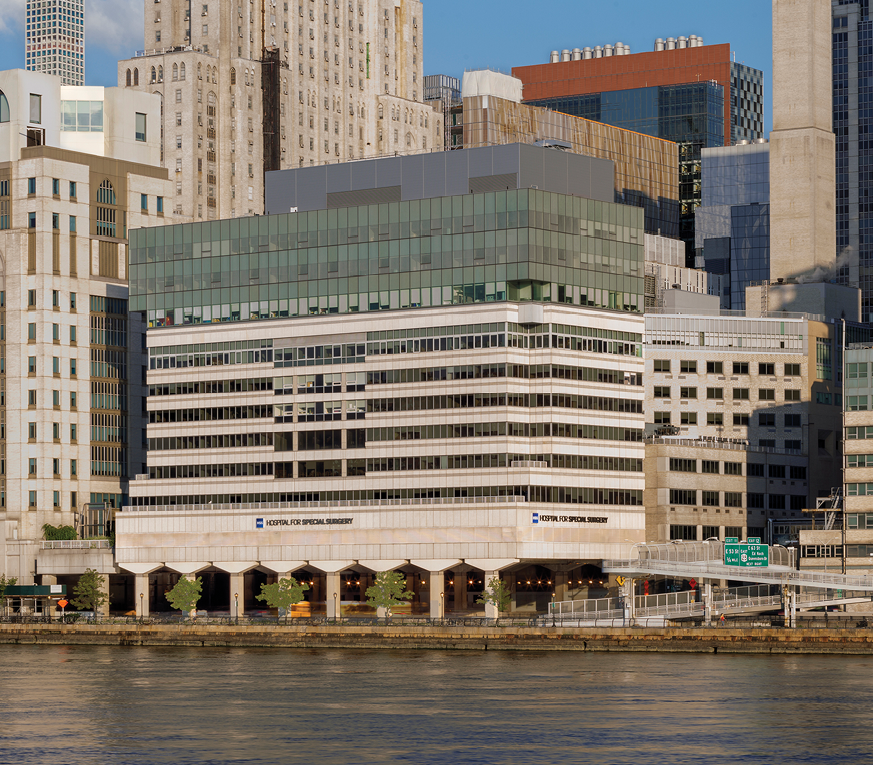- Home
- Media Kit
- Current Issue
- Past Issues
- Ad Specs-Submission
- Ad Print Settings
- Reprints (PDF)
- Photo Specifications (PDF)
- Contact Us

![]()
ONLINE

Continuous Improvement
Editors’ Note
Lou Shapiro assumed his current position in October 2006. Previously, he served as Executive Vice President and Chief Operating Officer of Geisinger Health System’s Clinical Enterprise. He began his career at Allegheny General Hospital in Pittsburgh and then joined McKinsey & Company as a leader within their healthcare practice. Shapiro is a fellow of the American College of Healthcare Executives, former Chair of the Greater New York Hospital Association Board of Governors (2014-2015), and serves on multiple nonprofit boards.
Institution Brief
HSS (hss.edu) is the world’s leading academic medical center focused on musculoskeletal health. At its core is Hospital for Special Surgery, nationally ranked No. 1 in orthopedics (for the twelfth consecutive year) and No. 4 in rheumatology by U.S. News & World Report (2021-2022), and named a leader in pediatric orthopedics by U.S. News & World Report “Best Children’s Hospitals” (2021-2022). HSS has a main campus in New York City and a growing network of related facilities. In 2020, HSS performed more than 35,000 surgical procedures, and people from all 50 U.S. states and 89 countries traveled to receive care at HSS. In addition to patient care, HSS leads the field in research, innovation and education. Through HSS Global Ventures and the HSS Education Institute, the institution is collaborating with medical centers and other organizations to advance the quality and value of musculoskeletal care and to make world-class HSS care more widely accessible nationally and internationally. HSS is the official hospital for a number of professional sports organizations and teams including the New York Giants, New York Mets, New York Knicks, Brooklyn Nets, UFC, US Rowing, US Biathlon, US Lacrosse, and USA Basketball. HSS is one of only three hospitals in the United States designated as a Medical Center of Excellence by FIFA.

The HSS main campus in New York City
HSS is a purpose-driven organization with a long history of supporting its employees, patients and communities. How do you define HSS’ purpose?
Our purpose, the reason why we exist, is to help people get back to what they need and love to do better than any other place in the world. With respect to patient care, we are singularly focused on delivering the highest quality patient care, improving mobility and enhancing quality of life for all. As an academic medical center, we also have a responsibility to advance the science of musculoskeletal medicine which includes orthopedic surgery and rheumatology, through research and education.
What have been the keys to HSS’s success and consistent industry leadership?
As an organization, we at HSS operate under the philosophy of “Leadership By All,” where everyone is a leader regardless of role. This philosophy is what allows us to provide the very best care to patients every single day. It’s one of the reasons we as an organization have been ranked the top hospital in the nation for orthopedics for 12 consecutive years by U.S. News and World Report and the world #1 according to Newsweek.
“In order to meet the growing demand for our services, HSS is investing in new facilities and enhancements to our main campus on the Upper East Side of Manhattan. At the heart of this plan is construction of the Anna-Maria and Stephen Kellen Tower.”
Will you provide an overview of the expansion of the HSS campus with its new 12-story tower and how this will impact HSS’ ability to serve its patients?
In order to meet the growing demand for our services, HSS is investing in new facilities and enhancements to our main campus on the Upper East Side of Manhattan. At the heart of this plan is construction of the Anna-Maria and Stephen Kellen Tower. This 94,000-square-foot clinical building will expand care for joint replacement and spine conditions with three private inpatient floors, physician offices and exam rooms, and on-site imaging to support our high-quality musculoskeletal care. The added capacity created by these new inpatient units and renovation of existing floors in the main hospital will allow HSS to transition from 30 to 70 percent private patient rooms across the main campus, an institutional priority underscored by the pandemic and necessary to optimizing the healing environment for our patients. We plan to break ground this fall and open the building in 2024.
What do you see as the biggest challenges facing leading health systems and hospitals as you look to the future?
Healthcare is evolving like we’ve never seen it before due to the acceleration of many interconnected industry trends. Consumers are rapidly changing how and where they utilize healthcare services. Growth in the use of digital technology is transforming the care delivery ecosystem. In orthopedics, the shift from inpatient to outpatient has accelerated, resulting in more traditionally inpatient procedures being done in an outpatient surgery setting. The ability to adapt to these trends, and in many instances prepare for their continued acceleration, will require navigating uncertainty, embodying a culture of agility, and ensuring continued teamwork and collaboration.

The HSS main campus in New York City
What is your vision for the evolving role of the hospital as health systems grow their ambulatory care and outpatient facilities?
As outpatient facilities become more the norm, we will likely see hospitals become increasingly focused on the treatment of patients with complex needs. HSS has been at the forefront of this trend. Patients come to us from all over the world to receive complex orthopedic care at our main campus location in New York City; meanwhile, we have opened locations throughout the New York tristate region, plus an outpatient surgical center in West Palm Beach, Florida, to better meet the needs of patients requiring ambulatory care. This approach has allowed us to ensure an added level of oversight for those patients who need to be admitted to the hospital while enhancing the overall outpatient experience.
There is a great deal of discussion about New York’s future. In leading an institution like HSS with such a long and storied history in New York, are you optimistic that New York will recover and rebuild in order to remain a leading global city?
I am very optimistic. New York has faced many challenges before COVID, and it will no doubt face many more. New York bounces back. That’s what we do. HSS is investing in the critical infrastructure needed to increase our patient care capacity at our main campus in Manhattan. We wouldn’t be doing that if we didn’t believe in the future of the city.
What do you see as the keys to New York City’s recovery and how critical is it for there to be a strong public/private partnership working together to secure New York’s future?
At HSS, we are constantly adapting to a changing landscape as needs and priorities shift. If you do everything exactly how you were doing it before a crisis, you will not succeed. New York has a tremendous opportunity to continue to grow and evolve as a city. I believe that partnerships of all kinds, including those between the public and private sectors, can only make us stronger as a community. We saw that play out in New York during the pandemic, and we will continue to see that as investments are made across the city in pivotal industries such as technology, life sciences, and healthcare.
What advice do you offer young people interested in building a career in healthcare?
Stay true to your values and principles, especially during difficult times, and never settle for the status quo. There’s always room for improvement. A commitment to continual improvement on the part of everyone at HSS is what has made us the world-class organization we are today.![]()